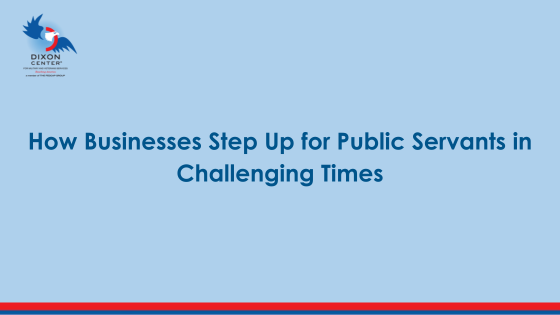How Businesses Step Up for Public Servants in Challenging Times

According to recent estimates, approximately one-third of federal employees are veterans. What’s more, a significant number of federal workers are military spouses, especially as various agencies actively recruit and support military spouses through specialized hiring programs and initiatives. Today’s federal workforce reflects the government’s commitment to hiring those who have served in the U.S. military and underscores the importance of federal employment as a career pathway for both veterans and military families.
Impacted by furloughs and delayed paychecks, many federal employees face sudden financial hardship during U.S. federal government shutdowns. In response, several companies and organizations have offered support to affected workers, demonstrating a commitment to community welfare and corporate social responsibility. This blog outlines various types of assistance provided and highlights notable companies that have stepped up during past shutdowns.
It’s important to note that federal employees affected by government shutdowns are not solely based in Washington, DC. In fact, most federal workers are located outside our nation’s capital. These individuals live and work across all 50 states, in U.S. territories, and even in foreign countries – serving in a wide range of roles at agencies such as the Department of Veterans Affairs, the Transportation Security Administration, and the National Park Service, among others. As a result, the impact of a shutdown – especially the current shutdown as it nears record length – is felt nationwide.
Support Informed by the Eight Dimensions of Wellness
When considering the well-being of federal employees, veterans and military families affected by a government shutdown, it is critical to consider the eight dimensions of wellness. Addressing each of these areas can help individuals and organizations provide more comprehensive support during challenging times:
- Emotional Wellness: Shutdowns can cause stress, anxiety, and uncertainty. Access to counseling services, mental health resources, and peer support can help federal employees manage emotional challenges.
- Financial Wellness: Delayed paychecks and furloughs may threaten financial stability. Temporary loans, waived fees, budgeting assistance, and financial planning resources are vital supports.
- Occupational Wellness: Work disruptions may impact job satisfaction and career progression. Providing career counseling, skills development, and reassurance about job security can address occupational concerns.
- Physical Wellness: Financial strain may affect access to healthy food, exercise, and healthcare. Community food banks, discounted gym memberships, and telehealth services can promote physical health.
- Social Wellness: Social connections may be strained during periods of uncertainty. Encouraging participation in support groups, community events, and family activities helps maintain social networks.
- Intellectual Wellness: Opportunities for learning and personal growth may be disrupted. Free online courses, library access, and workshops can help employees continue intellectual pursuits.
- Spiritual Wellness: For some, shutdowns may challenge a sense of purpose or faith. Access to spiritual counseling, meditation groups, or faith-based community services can provide comfort.
- Environmental Wellness: The workplace and home environment may be affected by financial or emotional stress. Promoting safe, healthy, and supportive environments at home and in communities is important for overall wellness.
By developing tools and providing resources based on these eight dimensions, companies, nonprofits, and community organizations can better support federal employees and their families.
Examples of Support Provided
- Financial Assistance: Temporary loans, waived fees, and deferred payments on loans or bills.
- Discounted or Free Services: Complimentary meals, reduced transportation fares, or free entertainment options.
- Special Payment Arrangements: Utility companies and lenders allowing payment deferrals or flexible arrangements.
- Community and Nonprofit Support: Food banks and charitable organizations increasing outreach to affected families.
- Health and Wellness Support: Mental health advocacy, counseling services, trauma-informed care, peer support networks, and telehealth options tailored to veterans, their families, and federal employees.
Notable Companies Offering Support
While the list of supporting businesses can vary between shutdowns, the following companies and sectors have consistently provided assistance in recent years:
- Banks & Credit Unions:
- Navy Federal Credit Union: Zero-interest loans and payment extensions for members who are federal employees.
- USAA: Low-interest loans and financial counseling for affected members.
- Wells Fargo, Bank of America, Chase: Fee waivers, loan modifications, and flexible payment options for customers experiencing hardship due to shutdowns.
- Telecommunications Providers:
- AT&T, Verizon, T-Mobile, Sprint: Flexible payment options and waiving late fees for federal workers during shutdowns.
- Utilities and Energy Companies:
- Many regional utilities, such as Washington Gas and Pepco, have offered deferred payment plans.
- Restaurants, Retail and Food Chains:
- Kroger, Walmart, Safeway: Donations to local food banks and sometimes direct discounts or support to federal employees.
- Chains and local eateries (e.g., Shake Shack, Potbelly Sandwich Shop) offer free or discounted meals with federal ID.
- Transportation and Travel:
- Metro (WMATA): Emergency fare credits and flexible payment plans.
- Some airlines and travel companies have waived change/cancellation fees for impacted travelers.
- Community-Based Support:
- Food Banks: Capital Area Food Bank and others increased distributions to federal families during shutdowns.
- Nonprofits: United Way and local charities often coordinate extra resources and assistance events.
Health and Wellness Support
In addition to financial and community assistance, trauma-informed care services have become increasingly accessible for federal employees and veterans during government shutdowns. These services are designed to recognize and respond to the unique stress and anxiety that can accompany such periods of instability. Peer support networks, both online and in-person, offer federal workers and veterans a safe space to share experiences and access emotional support.
Telehealth options tailored specifically for veterans, their families, and federal employees have expanded, providing remote access to mental health professionals, counseling, and wellness resources. These platforms often feature confidential consultations and are equipped to address issues like anxiety, depression, and trauma related to employment uncertainty. Leveraging these resources can help individuals maintain their mental health and resilience during challenging times.
Corporations play an important role in normalizing mental health conversations, especially during government shutdowns. Through intentional internal communications, visible leadership support, and sharing personal stories, organizations can help reduce stigma and foster a culture of understanding. Hosting wellness webinars and encouraging open dialogue about mental health challenges can further empower federal employees and veterans to seek help, ultimately strengthening workplace resilience and well-being.
Framing mental health support as a civic responsibility during government shutdowns resonates strongly with both organizations and individuals. By treating mental health care as a shared community obligation, companies, nonprofits, and government agencies can help foster collective resilience and solidarity. This approach encourages everyone to actively participate in creating supportive environments, reducing stigma, and ensuring federal employees and veterans receive the help they need during times of instability.
Viewing mental health support through this lens highlights the importance of empathy and mutual aid, reinforcing that caring for one another strengthens the whole community. Such civic-minded initiatives empower people to advocate for accessible resources and promote long-term mental wellness, making it clear that supporting those affected by shutdowns is not just compassionate, but essential to the health of our society.
Examples of organizations providing mental health support to federal employees during government shutdowns include the Department of Veterans Affairs, which expands telehealth and counseling services targeted at both veterans and current federal workers. The Federal Employee Assistance Program (EAP) often enhances access to confidential counseling, stress management resources, and crisis hotlines specifically for those impacted by shutdowns. Nonprofit groups such as Give an Hour and Mental Health
America have also launched special initiatives, offering free or reduced-cost therapy sessions, support groups, and wellness webinars tailored to the unique stressors faced by federal employees and their families during these periods. Cohen Veterans Network provides high quality accessible mental health care to veterans, service members, and their families. Their services are provided regardless of discharge status, insurance coverage, or ability to pay. Additionally, some major health insurance providers temporarily waive co-pays for mental health appointments, recognizing the increased need for accessible care in times of uncertainty.
How to Find Current Support
The list of supporting companies can change with each government shutdown. For the most up-to-date information, affected employees should:
- Check employer and union announcements for available resources.
- Contact their financial institutions and service providers about special programs.
- Visit local government and nonprofit websites for community support events and food distributions.
- Monitor news outlets and official social media channels for announcements from businesses offering assistance.
Conclusion
Companies and community organizations can step up to play a crucial role in supporting federal employees during challenging times, including a government shutdown. Efforts like those highlighted above help ease financial burdens and provide much-needed relief during uncertain times. Federal workers are encouraged to seek out and utilize these resources whenever necessary.

